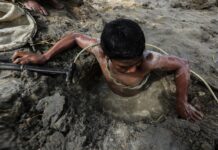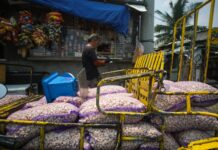While top athletes duke it out in stadiums at this year’s Asian Games, Indonesia’s agrarian backwaters have their own versions of sporting entertainment, starring the very bovines that plough the fields
Makepung: (A Chase)
Where : West Bali, Jembrana regency
When : July to November, various circuits across the Melaya district
Course : 3-kilometre-long dirt track circuits

Once a celebration of the rice harvest by Madurese migrants, then popularised and formalised in the 1930s, this water buffalo grand prix sees hundreds of jockeys and their animal companions vie for the Jembrana Regent’s Cup. Only the best of the racers participate in the finals in Tuwed village’s Sangyang Cerik circuit, typically at the year’s end. To clinch the USD1,500 winnings – the equivalent of a farmer’s annual salary – jockeys must surpass their rivals by more than 10 metres to compensate for staggered starting times. A 60-year-old rivalry between teams from the east and west banks of the Ijo Gading River pit the green flags of the Barat team against the Timur’s red, but both sides take pride in showing off equally bedecked wooden carts and water buffalo in elaborate headdresses.
Related: The Uniquely Southeast Asian Sport of Sepak Takraw
Pacu Jawi: (Fast bulls)
Where : West Sumatra, Tanah Datar regency
When : 11 months a year, one month in each of 11 sub-districts
Course : 30-metre-long paddy fields

Originating from a Sumatran thanksgiving harvest ritual, this race involves jockeys gripping a thin rope harnessing two bulls while balancing barefoot on a wooden plough. After a provocative bite on each tail, teams of three make a muddy plough toward the finish line to the tune of traditional talempong music.
Related: The Politics of Sports in the Asian Games
The winning bulls can fetch up to USD4,000 in the livestock market – over double the regular rate – so jockeys help them reach champion speeds by administering a second bite during the race, typically at the field’s midpoint. But the bulls tend to charge off in oblique directions, so lesser riders often end up in comedic positions while spectators cheer, laugh, and dodge the rogue animals. To keep his bulls together, 2017 winner Hamid recommends grabbing onto their tails: “It’s like a steering wheel!” he says. Winning bulls also get their own swimming pools.
*Other races, like Madura Island’s karapan sapi have been denounced for cruel practices like whipping and dabbing chillies on bulls’ eyes. In addition, many believe animal races to be a form of cruelty to animals.
Related: How Gaming Became an Athletic Event
For other stories from this issue, see Asian Geographic Issue 131, 2018











